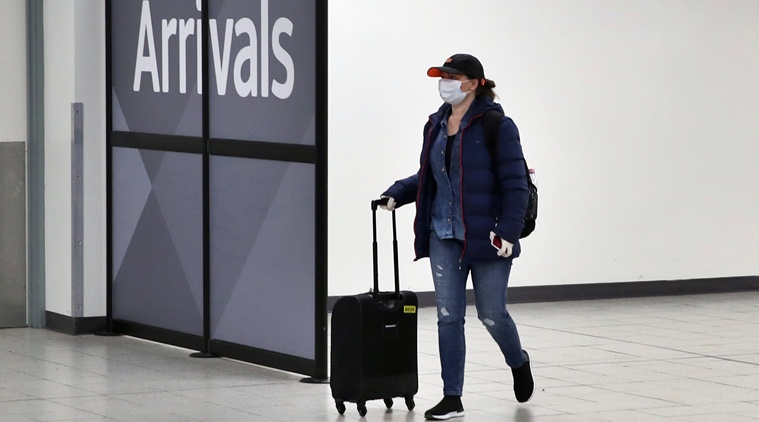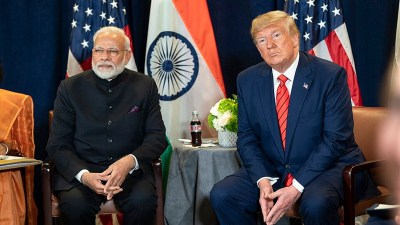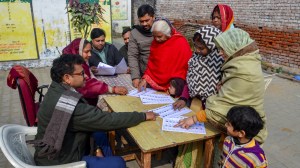It was at 2 am Tuesday when Wasim Akram finally managed to book a flight back home. He will leave for India on a 11 am British Airways flight on March 18.
Akram, who is pursuing a masters degree in conservation biology at the University of Kent, is among the lucky few to have just managed to evade India’s ban on the entry of all passengers from Europe, the United Kingdom (UK) and Turkey starting March 18.

The UK has reported 1,950 confirmed cases till now and 71 deaths. According to the UK government’s statement to the House of Commons’s Health Committee Tuesday, as many as 55,000 people are estimated to be infected.
Indians make up the third-largest group of international students in the UK, with more than 30,000 receiving a Tier 4 (study) visa last year alone. When the government announced the travel ban Monday evening, it led to a mad scramble among them to rush back home.
In the last week, many universities in the UK, including the London School of Economics, King’s College London, University of Sussex, University of Kent and the University of Durham have announced plans to replace classes with video lectures and online seminars, end term early, or to cancel exams.
Many students rescheduled their plans to make an early exit. “We had only 24 hours to make a decision, book a ticket, pack up and leave,” said Akram, who had earlier bought a ticket for April 15. “I haven’t been able to cancel that. I had to spend another Rs 40,000 for a ticket at such short notice.”
Reetika Subramanian (29) had her tickets booked for return to India on March 22. “Our college (Queen’s College affiliated to Cambridge University) sent us an email to vacate our accommodation by March 18. Since I needed time to wrap things up, I managed to get permission to leave by March 22. But (following the India ban) I had no option,” said Subramanian.
Story continues below this ad
The ticket she bought for 300 pounds was selling for over 1,000 pounds (roughly Rs 1 lakh) a few hours later, she said.
Unable to find a direct flight, Madhurima Sanyal (23) is coming to India via Dubai, which means she may be placed under compulsory quarantine for two weeks upon arrival. “By the time I got online to check for tickets, all direct flights were sold out,” said Sanyal, who is pursuing a masters in gender and development at the University of Sussex.
The National Indian Students and Alumni Union UK (NISAU, UK) has been fielding calls from students and parents since India announced the ban.
One reason for the panic is the UK government’s response to the pandemic, widely seen as an outlier compared to other countries. At his first press conference, Prime Minister Boris Johnson said they were looking at a herd immunity strategy, with the population expected to develop resistance to the virus once a sufficiently large number, i.e. 60 per cent, was infected. Contrary to the WHO’s recommendation for expanding testing, the UK has been advising anyone with symptoms to self-isolate. Following severe backlash, on Monday evening, the PM issued an advisory to people to avoid all non-essential social contacts and travel. However, schools, pubs, theatres and other such crowded places remain open.
Story continues below this ad
NISAU UK chairperson Sanam Arora said many students planned to leave for India already as they felt “the UK government is not doing enough”. “After the Indian Ministry orders, there was first a lot of confusion and then panic. They never expected that they would be barred from going back to India.”
Akram said things in the UK were deteriorating. “There is a shortage of supplies. I had trouble shopping for groceries recently. We also hear that the health system here is strained. I haven’t been able to find a hand sanitiser or face mask. I tried ordering online, but the delivery will only be in April,” he said.
Another reason he was leaving, he said, was that India didn’t have compulsory quarantine for those arriving from the UK yet.
Subramanian, who said she reached the Heathrow Airport five hours before her flight Tuesday anticipating stringent checks, said the screening was also lax. “The Indian passengers were mostly students, all wearing masks, all there hours before time. However, once the counters opened, the security and baggage clearance was over in 20 minutes. There was no special screening or temperature check whatsoever,” she said.
Story continues below this ad
Sanyal, who feared a “mental breakdown” if she stayed on in her deserted university accommodation, added they were worried about attendance. “Students with Tier 4 visa are monitored regularly for this. Many of us were worried about how our attendance would be recorded once classes moved online. Our tutors have clarified that it will not be a problem for international students.”
At Oxford University too, students said some colleges had “encouraged” students to vacate residences and go home. “They said you can stay if you have ‘a compelling reason’,” MPhil candidate Shruti Iyer said.
S Ahmed, an MA student at the University of Sussex, with tickets for India for March 27, is stuck. “My course placement requires me to work in a school for infants. Since the UK government has not ordered closure of schools yet, I could not leave before the usual Easter break. I would rather be home with my family if I have to self-isolate, than be here,” Ahmed said.
Students like Ahmed are banking on support systems like WhatsApp groups of Indians on the campus or local community members, set up to deal with the crisis. Adrija Dey, a post-doctoral student who is part of the India SOAS Society, said they have started a petition to demand better accountability from universities towards students who have no where else to go.
Story continues below this ad
The London-based SOAS has among the largest number of South Asian students in the country. “A bunch of students from SOAS left for India on Tuesday. They were the privileged ones who could afford expensive tickets; those on scholarships and from middle-class families had to stay behind. Many such students live in the university’s official residences, which they share with flatmates. If they show symptoms, they won’t be tested but will have to just self-isolate. There are no clear instructions as to what they can do in such a situation,” she said.
Dey added that the greatest concern right now is the mental health of students. “We are trying to provide whatever peer support we can,” she said.

 A woman wearing a face mask walks through Luton Airport as the number of coronavirus cases grow around the world, in London, Britain, March 17, 2020. (Reuters)
A woman wearing a face mask walks through Luton Airport as the number of coronavirus cases grow around the world, in London, Britain, March 17, 2020. (Reuters)






























